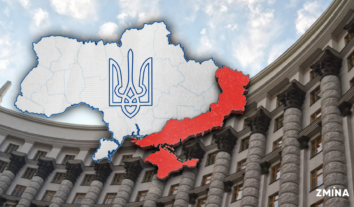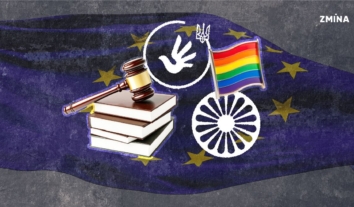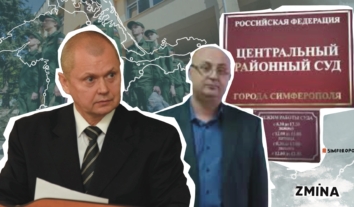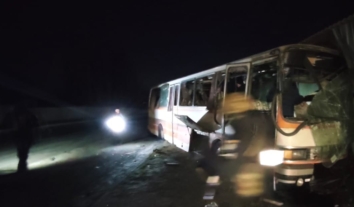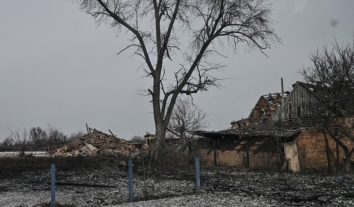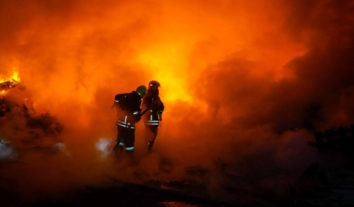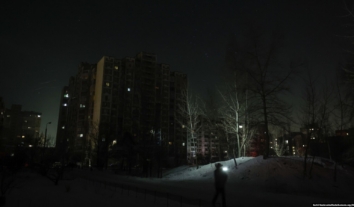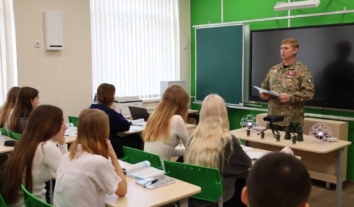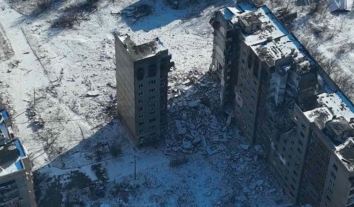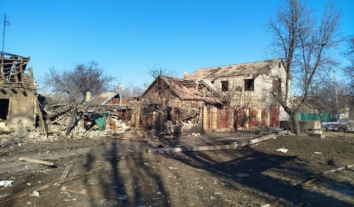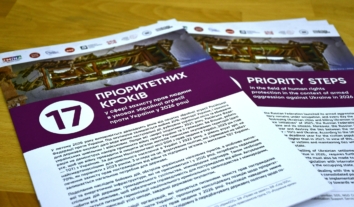“We no longer need to prove we have a right to exist”: USA veteran Lindsay Church on LGBTQ people and women in the military, inclusion and working with survivors
The Ukrainian military, like Ukraine in general, often focuses on the United States of America. Their values, military training, level of education and work, as well as living conditions often cause admiration and reflection: “We need it too”.
Even the issue of equality and non–discrimination appeared in the states several dozen (or hundreds?) years earlier than in Ukraine. Hence the post-Soviet narratives about “depraved America”.
But is everything really as positive as it seems to us at first glance?
ZMINA spoke with US–Ukrainian Veterans Bridge strategic advisor and co–founder of Minority Veterans of America, Lindsay Church, about the real situation of LGBTQ people and women in the US military, as well as the challenges facing US and Ukrainian veterans, regardless of their sexual orientation and gender identity.
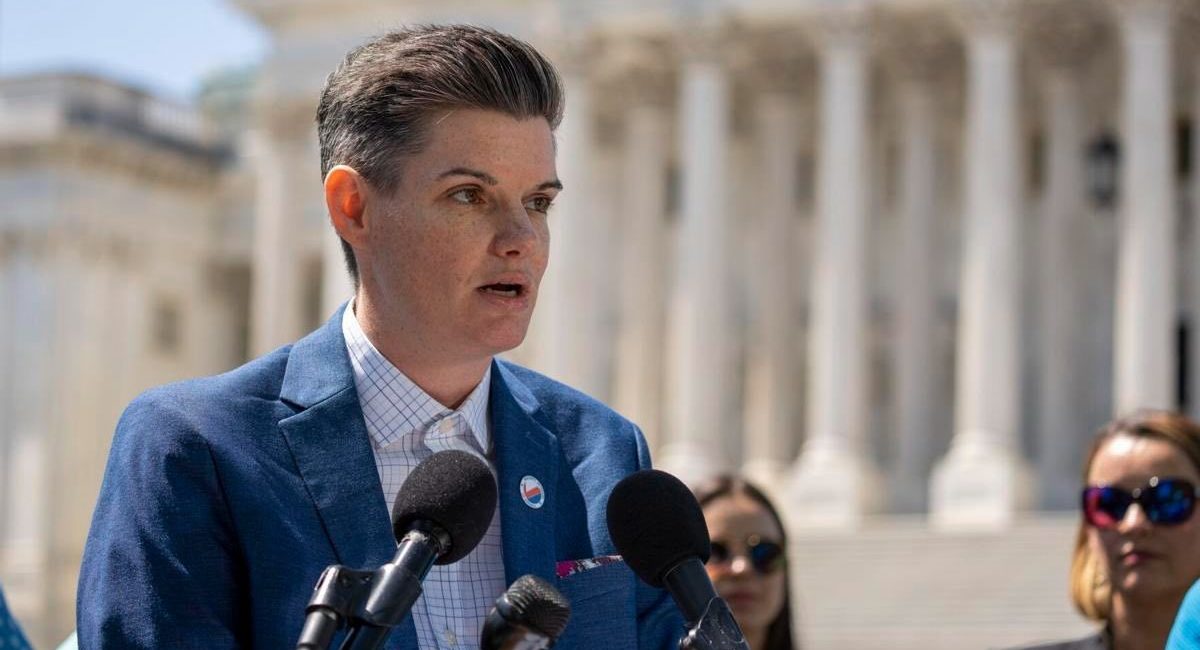 Photo from personal archive Lindsay Church
Photo from personal archive Lindsay ChurchDisclaimer: Lindsay Church is a transgender nonbinary queer person who uses the gender neutral pronoun “they/them”.
Please tell us about yourself and your military experience. How and when did you decide to join the military service?
I served in the Navy from 2008 to 2012. I am a third generation military veteran, most of my family members have served in the Navy with a few in the Air Force as well.
In general, I wanted to join the military in 2003, but at that time there was an regulation in the US military – “Don’t Ask, Don’t Tell”. From 1993 to 2011 LGBTQ people could serve in the military, but they could not openly declare their sexual orientation or gender identity. I decided to wait.
In 2008, I still felt that I wanted to serve my country so I decided to join the Navy to become a Persian–Farsi linguist. I decided not to come out and to hide my sexual orientation and gender identity so that I could serve.
How were women treated in the American military that time? Perhaps they were also discriminated against – given easier tasks, offered lower positions?
I’m the child of a woman veteran who served in the US Navy from 1978 to 1988. She shared stories of the discrimination she faced in service that were still present when I served in the Navy 30 years later. Women faced discrimination when it came to the jobs available to them (including combat roles which didn’t open to women until recent years), persistent sexual harassment and violence, and overall, the military often wasn’t built with women in mind. From poorly fitting uniforms to barriers to where, how, and how many could serve at any given time, women have faced challenges since the first women served in the Revolutionary War.
You mentioned the “Don’t Ask, Don’t Tell” rule. So if someone found out that there was an LGBTQ person among the military, they could be expelled?
Initially, this policy was introduced ostensibly to protect LGBTQ people: they say they can be in the military, but should not reveal their gender identity or sexual orientation, so that LGBTQ people would not detract from unit readiness. When the policy was implemented however, LGBTQ service members often faced greater persecution. In spite of the policy requiring service in silence, there were still active operations to identify people from the community among the ranks.
A few years before I joined the military, 13 linguists were kicked out because they were LGBTQ. They didn’t come out, they were actually discovered. Back then, it was very scary to be an LGBTQ person in the military – at any moment, colleagues could find out that you had a partner of the same sex, or see that you were visiting a gay bar which could have resulted in a dishonorable discharge and the loss of benefits and a return home, and this would remain on your record for the rest of your life.
During this policy of persecution, about 14,000 people were discharged under Don’t Ask, Don’t Tell with an additional 14,000 LGBTQ dismissed using other methods. I knew that at any moment I could be exposed and therefore I had to hide parts of myself and live a double life, I felt like I was two different people – an LGBTQ person and a military service member.
At the time I served American culture and society was not ready for LGBTQ people to serve openly in the military. Although a large part of the American military was supportive of us, others still had a negative attitude. This led to many cases of sexual violence against LGBTQ+ people, because violence is not about sex, it’s about power. Even I faced the fact that one of the partners threatened me that if I stopped dating her that she would tell my superiors that I was LGBTQ.
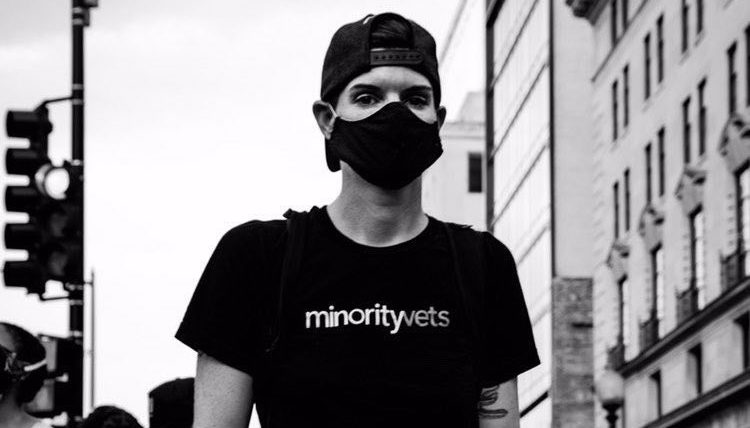 Photo from personal archive Lindsay Church
Photo from personal archive Lindsay ChurchAnd did the LGBTQ military somehow communicate with each other, were there any points of intersection?
Yes, we had a small community and many of us were familiar with each other. Sometimes we went to gay bars or to Pride festivals together. One year, a group of us went to San Francisco Pride where we had to go in hiding so we wouldn’t be seen or photographed. To protect us, we were allowed to go to gay bars without a queue, because they understood that our secret couldn’t be revealed. It was truly a unique experience.
I would say that this experience was somewhat extreme. Your service lasted 4 years, what happened after that?
Later, I was injured and spent 5 months living in a military hospital with other service members returning from Iraq and Afghanistan, many who were seriously injured, lost arms, legs and eyes.
In 2012, when I finished my military service and returned home, it was very difficult for me to adapt to civilian life. I didn’t have the resources or tools I needed to deal with the PTSD, severe depression, and anxiety that I was returning with. I returned to college and met some veterans there. It helped me find a new community. Together we founded an organization that works on the issues of minorities in the military and veteran community, because their experiences and needs are quite different. When you are from a minority identity, it is more difficult for you to serve and to transition to civilian life. Therefore, we created an organization that works on the issues facing racial and ethnic, sexual, gender, and religious minorities. We all belong to certain communities. We are inside the veteran environment. That is, out of 18–20 million veterans, there are only 1–2 million of us but when each of our minority communities come together we are closer to 10 million. Our organization conducts programmatic and advocacy work, and also meets with veterans from various communities and seeks ways to support them.
You said that during your service you had to be a separate LGBTQ person and a separate military person. After you became a veteran, when did you manage to combine these identities?
Yes, when I came home I just didn’t know how to be LGBTQ and a veteran at the same time. When I said I was a veteran, I couldn’t mention that I was LGBTQ because I had to hide that part of myself in service. When I said that I belong to the LGBTQ community, I couldn’t talk about military service, because the LGBTQ community didn’t always accept it. In both of these communities I felt like I didn’t fully belong.
It took me about 5–8 years to recover and start talking about it. I found like–minded people and started sharing my experiences and realized that this is not just my problem. The veteran environment has also long been quite toxic and unwelcoming to LGBTQ people. That’s when we created Minority Veterans of America to work to create an organization that would welcome us.
Your organization started with two people and now has over 3,000 people across the country. How did you decide to establish it, what was the starting point and root cause?
I studied in Washington state, where I met my close friend, Katherine Pratt. She is a Korean–American veteran, one of the smartest people I know, and holds a Ph.D. in electrical engineering. She served in the Air Force and served in the military but did not serve in combat. She doubted for a long time whether she could call herself a “veteran”.
We have different experiences – I am a transgender LGBTQ person and she is a Korean American woman veteran. But our feelings of not being wanted in the veteran community were similar.
In the end, when we corresponded, we planned to create an organization that would be a kind of intersectional movement, so it would cover several issues and relate to several identities. So we decided to take care of housing, food, work and health security among people belonging to minorities in terms of ethnic origin, sexual orientation or gender identity, as well as religion.
We began to unite and became a strong community. Since 2017, from two people chatting on messenger, we have turned into five people gathered in my room, and now we are a community of 3,000 people from all over the country and the world.
Our organization has a voice. We are working on improving legislation and policy. All changes require time and effort. And the stronger and bigger we become, the harder it is for our government to maintain the status quo or keep the situation unchanged.
6 years ago you were told that your organization should not exist and that it would not achieve anything. What is it like to continue working despite criticism and harassment?
In 2017, Donald Trump became the president of the USA. It was then that we saw the first crackdown on reproductive rights, as well as laws that discriminated against Muslims – many Muslim countries were banned from traveling to the United States. Subsequently, Trump announced that transgender people would not be accepted for military service in the United States.
This was the impetus for the organization as we saw that people from different communities were at risk. At the time, many organizations believed that minorities wanted privileges or special rights. They believed that we should not exist, so they were hostile towards us.
But we tried to do everything so that veterans from different communities could live with dignity and have all the opportunities to achieve success that everyone else has.
Over time, as more research and data has emerged about the experiences of different minorities in the military, we have been able to prove that there are people in the military with different identities and that those identities lead to unique needs.
It was difficult and the Trump administration was hostile to minority groups around the country. But now, seven years after the creation of the organization, many in our community understand that our organization and work we do is needed. We no longer have to prove that we belong in the conversation about service members and veterans.
What is your organization currently doing to achieve an equal and just world for veterans? I saw that you hold lectures, mass actions and generally engage in advocacy.
We work on programs and policies. The programs mean that we create various opportunities for minority veterans: we offer active outdoor recreation, we work on education and leadership development. All these programs are designed to meet current needs.
The second direction of our work is advocacy. We also work on the issue of reproductive rights and fight against sexual violence in the military. We work on the development of legislation for veterans that meets the current needs of veterans.
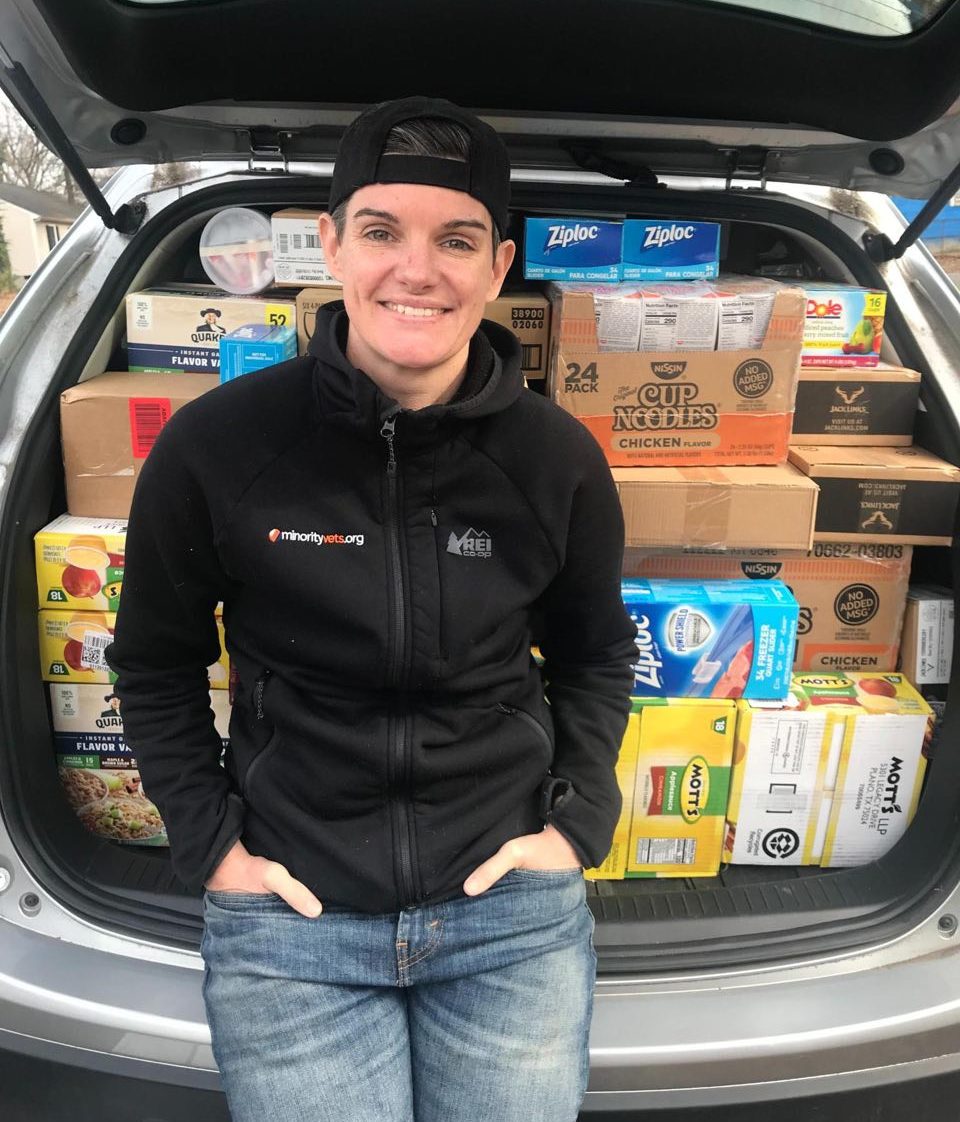 Photo from personal archive Lindsay Church
Photo from personal archive Lindsay ChurchYou are a strategic advisor of the American–Ukrainian Veteran Bridge. How does this cooperation take place and what is its purpose?
The US–Ukraine Veterans Bridge is about sharing knowledge, experience, and support. We’re here to listen, learn and understand how we can help because we can’t just sit back anymore. It’s not enough to just watch the war on TV from thousands of miles away and say “It’s none of my business”. In fact, we need to stand up and do something.
For us, it’s a matter of what we can hear from Ukrainian veterans about their experiences, needs, and questions about how we can help the Ukrainian Army in the future.
The term of military service is very short. The term of veteranship is very long. And over time, we’ve learned that if veterans are treated poorly, military recruitment declines. Accordingly, if veterans are treated well, recruiting increases. Therefore, we are here with the hope of supporting the veteran community and understanding how the system can be changed and improved for this rapidly growing group of Ukrainian veterans.
This will be the key to winning the war. This will help maintain the flow of people to military service. When you treat your people well, when you give them everything they need when they get home, when you honor and respect their service and not just take it for granted, the result is a strong military and a strong country. Therefore, our goal is to hear how we can support Ukrainian veterans.
Returning to the issue of LGBTQ people in the military, I would like to talk about how Ukraine can overcome the problem of discrimination and prejudice in the army. What steps do you think we as a society should take to overcome this problem? Currently, this issue rests only on the shoulders of public organizations.
One of the things Ukrainians can do is to talk about this problem. Highlighting the stories of LGBTQ people is one of the most important steps towards their acceptance in society. We need to talk about the people we meet in everyday life – neighbors, friends, brothers, sisters, parents, etc. Changes in perception occur when people know each other. Because when you know someone from the LGBTQ community, it is more difficult to speak out against homophobic or transphobic ideas. And it is easy for people who do not know these stories to promote these discriminatory narratives.
By the way, how do the American police respond to hate crimes?
We see that every year in the USA more and more transgender people and members of racial minorities are killed. Black transgender women are especially often victims. Often these murders are still classified as hate crimes, a crime that continues to rise each year.
America also has a significant problem with police violence. Some people, primarily representatives of various minorities, are more likely to face violence from law enforcement officers than to receive real help from them.
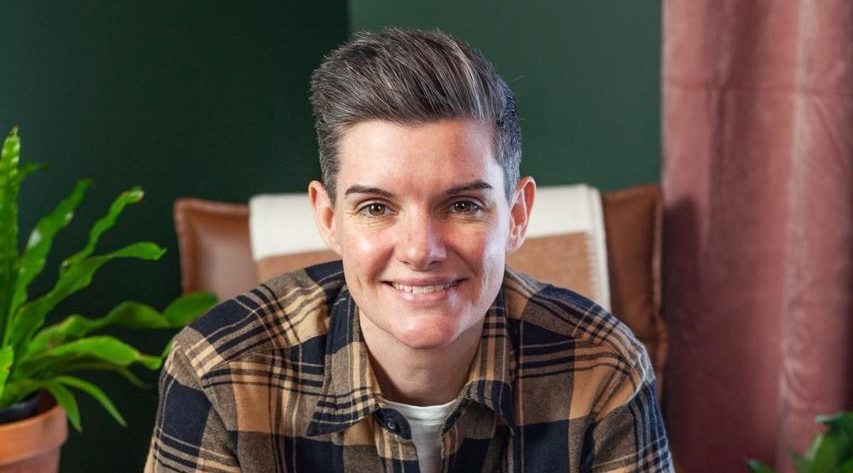 Photo from personal archive Lindsay Church
Photo from personal archive Lindsay ChurchThis question that concerns veterans. War traumatizes almost everyone – to one degree or another. Now in Ukraine it is often said that psychologists will be critically needed after the end of the war. All kinds of courses appear, and institutions of higher education encourage people to enroll in this specialty in every possible way. How critical is this need?
As I said before, I spent a long time in the hospital, and it really can be called hell on Earth. I had an operation, a metal rod was inserted into my ribcage. I did not want to live, and literally thought about jumping from my 5th floor window. The reason for this was not only the pain I felt at that moment, but also the understanding that I would feel it for the rest of my life.
One night the desire to die was extremely strong. I lived in a military hospital, so I went to the emergency department waiting room, sat down and stayed there until I felt safe enough to return home. I had a security clearance, and if I had shared my thoughts of suicide, it could have been taken away from me. Therefore, I tried to figure out how to continue living.
And I did it. I got up and went home, and then I sought psychological help. I was prescribed medications that I didn’t like, but at that moment they really saved me. For the first time, I started talking with a psychologist about what I was feeling, and I also talked about my belonging to the LGBTQ community.
We regularly lose people to suicide. In the USA, there is a real “epidemic” of suicides among veterans. For years, we were losing about 22 veterans a day. Now a day we lose 17 veterans and 1-2 servicemembers who commit suicide.
That is why our organization advocates for greater access to mental health care. Many military and veterans consider seeing a psychologist or psychiatrist as a sign of weakness, as if they are not strong enough to deal with their problems on their own. But military service breaks the psychological state, and people never come back the way they were before.
Even just being in the military is highly traumatic, not to mention being on the front line is just hell. Without psychological support, it is easy to die.
It takes some courage for military personnel or veterans to see a specialist, but it will save their lives. That’s true.
Another point that may be useful to us and will help us adopt the experience of America. Inclusion. How important is it for veterans and wounded service members? Is public space in America completely accessible? Because this is a hot topic for Ukraine, we have problems with it.
Americans are so fond of saying that our country is inclusive and accessible to people with disabilities. But it is not quite so. In fact, being a disabled veteran in the USA is very difficult, so you have to adapt all the time.
I don’t look like a seriously injured person, but I’m missing 4 ribs and have an implanted medical device – a spinal cord stimulator. I look healthy on the outside, but I also struggle with PTSD, depression, and anxiety.
Our society is still not ready for people like me and my veteran friends. We still have difficulty finding jobs, getting services, and even getting around the streets. In America, even in Washington, for example, there are streets on which it is impossible to use a wheelchair, because a person will simply fall out of it if they roll over the curbs and bumps in many places.
Therefore, America also has a long way to go to make its space inclusive. We still have to explain that not all types of disabilities are visible, as there are wounds invisible at first glance, as well as various mental health challenges. Sometimes it’s so tiring to have to explain it to people who don’t understand it or don’t believe it at all.
At such times, veterans feel isolated and feel that the country does not care about them. I think this is a universal feeling – both in America and in Ukraine. If Ukrainian society does not find ways to help veterans who return from the war, there is a risk of losing them – due to suicide, isolation or lack of access to necessary medical care.
Some Ukrainian servicemembers who have returned from the war and are seriously injured face the fact that civilians, passing by, simply look away and do not know how to react – to thank, sympathize, ignore…
It happens in America too. We have a phrase for this case: “Don’t look away”. Yes, it’s difficult, but that doesn’t mean you can’t be around and do something. We are the same as all other people. We just need love, compassion and support.
And it shouldn’t be something to look away from. The war traumatizes Ukrainian society, many people – both civilians and military or veterans – experience post-traumatic stress.
You have a special bond: you survive airstrikes, your windows are sealed with tape, and buildings are protected by sandbags. Many of you also have psychological trauma. And the more you look away from the military, the more you turn away from yourself and do not accept that this war has affected the physical or psychological state of many people. You hide your view from your own pain and trauma.
So it is necessary to create these special connections with each other, it is important for everyone.
From this follows the last question: how can we, as civilians, prepare for the return of our military and make their lives as comfortable as possible here, after all that they experienced?
I think a lot of the military from past generations didn’t get to talk about that, did they? Look at the return of veterans after the end of World War II. My wife has a grandfather who fought in the Battle of Tinian and also fought on various islands in the Pacific Ocean. As a Marine, he was decorated when he returned home. But he never talked about it.
I learned all this from his 95–year–old wife after his passing. When I started looking for information about it, I found out that his group had been involved in liberating the island. And he also worked on nuclear waste disposal after the bombing in Nagasaki. He was a patriot who didn’t talk about his service.
So one of the things that civilians can do is to talk, to listen, to be ready and open to stories, even if they are painful and uncomfortable. Veterans and military service members need to talk about it and get the suppor they need.
Returning to civilian life is very difficult. “How to get access to medical care?”, “Where to get psychological support?”, “How to get an education?” – help veterans find answers to these questions. And not in 10 years, but in 10 days after their return.
Help people find their way in government structures, help them find a job. These are easy things you can do to support. It sounds a little silly, but sometimes people have to relearn many things including how to choose their clothes.
It is not necessary to work in a veterans’ organization to help veterans. You are really helping them become civilians again. Be open and just be there.
Don’t let veterans be alone, because when people don’t get support and help, or just can’t talk about their service, they die.


